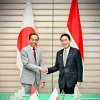World Economic Forum (WEF) highlights the slow economic growth of Indonesia due to high levels of corruption. Survey results, Indonesia ranked 36th in terms of economic competitiveness according to the release of the World Economic Forum (WEF) in 2017. Although it rose 5 levels from the previous position ,. In its official statement as quoted by Kiblat.net, Monday (02/10) "The most problematic factor in doing business in Indonesia is a high level of corruption reaching 13.8," The percentage was assessed from the survey results of respondents when asked to choose the five most problematic factors in conducting business in Indonesia.
Inefficient government bureaucracy aka convoluted licensing constraints with a value of 11.1 is also an obstacle. Government efforts in cutting licensing related to business have not produced tangible results so that business licensing regulations are still very overlapping. There are several other factors inhibiting economic growth, including: 1. access to finance with a value of 9.2. 2. Inadequate infrastructure supply 8.8. 3. Policy instability 8.6. 4. Government / coup instability 6.5. In addition, another obstacle is the amount of tax rates charged to the public at a percentage of 6.4. then followed by poor work ethics in the national workforce 5.8.
Likewise complicated tax regulations 5.2, crime and theft 4.0, limited labor regulations 4.0, foreign currency regulations 3.3 and insufficient capacity factors to innovate 2.5 inflations 4.7, insufficient educated workforce 4.3 ,. According to the WEF "In addition to the above inhibiting factors, the correspondent also assessed that Indonesia still has poor public health with a value of 1.8," In this regard, Indonesia has improved its performance in all WEF pillars assessing that Indonesia is similar to Korea.
The large market size with a ranking of 9th in the world and a relatively strong macroeconomic environment in rank 26 is the main driver of Indonesia's increasing position in the world ranking of 36th. Indonesia is one of the top innovators among developing countries. Therefore, Indonesia is ranked 31 and 32 in innovation and business sophistication.
The WEF explained "On the contrary, the country is lagging far enough in terms of technological readiness in the 80th rank. His record though has made steady progress on the front lines over the past decade, significant progress is also needed in the pillars of labor market efficiency where Indonesia is still far away ranked 96th. The reason is the existence of excessive redundancy costs and limited wage mastery flexibility, " Factors that make a very significant contribution in improving the quality of life of a nation are science and technology at this time, this is used as the backbone of economic and technological development.
As a result, resources (Resource Based Economy) become an economy based on knowledge and information (Knowledge Based Economy) as a form of economic transition from based as a result.
A large number of Western countries and several Asian countries provide funding for scientists to compete in mastering science and technology based on the paradigm shift proposed above. To increase product competitiveness and gain foreign exchange Appear then technological innovations that are applied to the industry. But it is unfortunate in terms of the technological authorities, Indonesia has not been able to follow other countries. "The low mastery of Indonesian technology is basically due to many factors," said Chairman of the National Alliance, and YSNB Trustee Pontjo Sutowo.
Present as speakers at this 16th DPS, were: Prof. Dr. Suhono Harso Supangkat and Dr. Yono Reaction Prodjo and Chair of the Joint Committee DPS Iman Sunario, and Prof. Dr. La Ode Kamaludin acted as the DPS moderator. Saying "For example, the weak synergy of science and technology policies, limited science and technology resources, especially research and development budgets," the science and technology intermediation mechanism is not yet optimal that bridges the interaction between the capacity of science and technology providers with the needs of users and the problem of technology diffusion or absorption.
As a result of the low mastery of these technologies, Indonesia has become very vulnerable to cyber-attacks. For example, the 2017 "Rannaomware WannaCry" attack. For this reason, Indonesia needs to immediately build Cyber technology independence because it is very likely that further attacks will have more impact and more systemic. Pontjo Sutowo said "Indonesia is now very urgent in need of independence of Cyber technology.
This independence can be formed if Indonesia is able to improve the existing 'National Security' doctrine and organize institutions with a clear regulatory framework. And if it can form technological independence, Indonesia will be able to maintain optimal security is provided ".











